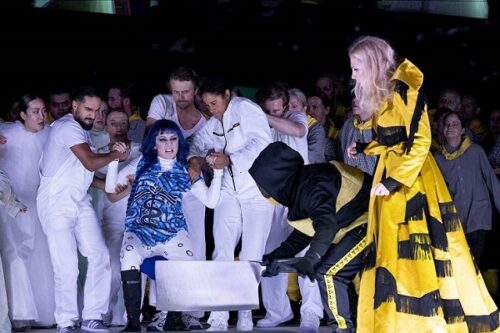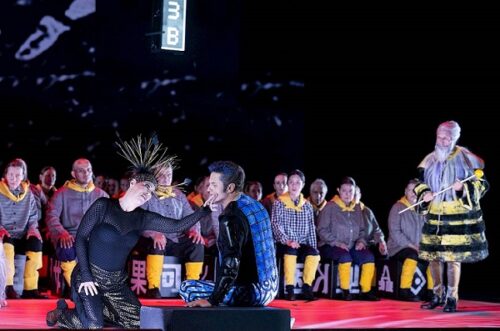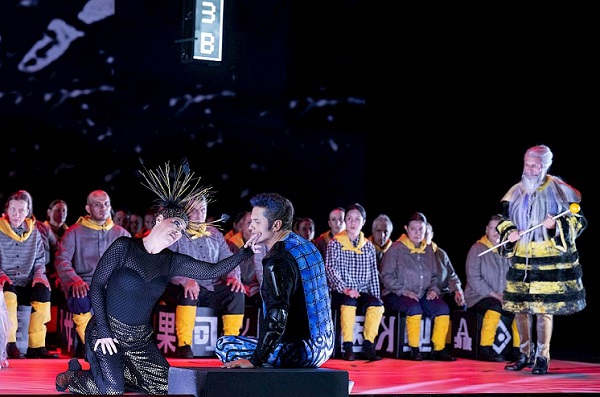 Switzerland Puccini, Turandot: Soloists, Chorus and Childrens’ Chorus of the Zurich Opera, Philharmonia Zurich / Marc Albrecht (conductor). Zurich Opera, 18.6.2023. (JR)
Switzerland Puccini, Turandot: Soloists, Chorus and Childrens’ Chorus of the Zurich Opera, Philharmonia Zurich / Marc Albrecht (conductor). Zurich Opera, 18.6.2023. (JR)

Production:
Director – Sebastian Baumgarten
Set – Thilo Reuther
Costumes – Christina Schmitt
Lighting – Elfried Roller
Video – Philipp Haupt
Chorus master – Janko Kastelic
Choreography –Sebastian Zuber
Dramaturgy – Claus Spahn
Cast:
Turandot – Sondra Radvanovsky
Altoum – Martin Zysset
Timur – Nicola Ulivieri
The Unknown Prince (Calaf) – Piotr Beczała
Liù – Rosa Feola
Ping – Xiaomeng Zhang
Pang – Iain Milne
Pong – Nathan Haller
A Mandarin – Jungrae Noah Kim
This Sebastian Baumgarten production – with Thilo Reuther’s sets and Christina Schmitt’s costumes – is ingenious, a riot both of colour and ideas: and it certainly succeeds. I might not have correctly interpreted all the symbolism, as there is a lot of it. Before the curtain goes up, stagehands are painting numbers on a white wall at the back of the stage. The people of Peking emerge, resembling what, at first, I took to be boy scouts, wearing bright yellow scarves, but they turned out to be worker bees. Police wore riot gear, holding long spears. The Mandarin, clinging to a thick rope, descended precariously from on high suspended by a huge grey party balloon to make his proclamation. Turandot is glimpsed in front of a honeycomb as the Queen Bee, holding a honeypot.
Timur, Calaf and Liù mingle with the crowd, dressed as though from another planet; Liù looked like an extra-terrestrial milkmaid, Calaf a dead ringer for Alvin Stardust. Ping, Pang and Pong came on with huge eyeballs over their heads, their costumes making them look like airline pilots; their abode was a pretty shack held up by glowing matchsticks. While they sang about their second homes in the country, blobs appeared which came to life – I was unsure what they were supposed to represent. Veiled beekeepers appeared amidst much dry ice and bearing beehive smokers.
The Emperor arrived, impressively, in a huge submarine. The riddle scene had all the elements of a TV game show – the crowd assist Calaf by displaying the answer to the first two riddles and the Emperor, tiring of all the beheaded Princes, points to his daughter to hint at the answer to the third potentially fatal riddle. It is all great fun, attractive, clever and a huge success – Zurich has struck liquid gold (honey) with this inventive production. Not a single boo was heard when the production team emerged, quite a rarity these days.
Marc Albrecht chose to end the opera with Liù’s death not with the marriage of Empress Turandot and Calaf (in the ‘Alfano’ or any other completion), so only using Puccini’s actual, unfinished score. Puccini had throat cancer and was unable to finish the score. It worked well, as Liù’s death is the tragic turning moment in the opera, and we then saw Calaf and Turandot alone on stage walking slowly towards each other, so we could guess there might be a happy end.
Videos were fantastic in all senses, the windows of Peking showing video screens and surveillance cameras during the long night in which the populace are ordered to discover Calaf’s name. Scenes of war, nuclear bomb explosions reminded us that the horrors of the past continue in the present.
Screens at the end of each act educated us that Puccini was very ill when he composed his final work, dying before finishing it, which explained why in this production the ending of such a bombastic opera finishes with a virtual whimper.

Vocally, the performance was a triumph. American-Canadian soprano Sondra Radvanovsky has recently recorded the role for Sir Antonio Pappano, following a concert performance, but had never sung the role on the stage. A star in many a Verdi opera, she found the vocal range in Turandot suited her very well. Her top notes thrilled and chilled. Piotr Beczała with his strong voice gave us a flawless ‘Nessun Dorma’ (oddly, with Turandot onstage as he began) but earlier a top note was missed; this was a role debut for him too.
Nicola Ulivieri was a firm Timur but looked much too young despite some added greying to his hair. Martin Zysset as the Emperor neither looked nor sounded decrepit enough, but, on a positive note, his singing was certainly clear and audible. I cannot say the same for Ping, Pang and Pong, who were sometimes strangely inaudible, especially when going backstage.
Italian soprano Rosa Feola sang the role of Liù and was wondrous, her acting and vocal skills were most impressive. A name to watch.
The chorus did the opera house proud, with plenty of volume; the offstage Childrens’ chorus were also exemplary.
Marc Albrecht was a veritable powerhouse in the pit, working the brass – particularly the trombones – into a frenzy whenever necessary and cleverly placing the xylophone in a side box for extra projection. The many gongs and the timpani were also clearly audible. It melded well with the bloodthirsty goings-on on stage.
A fantastic production of a fantastic opera – I cannot say more.
John Rhodes

Thank you John for the great review. I am looking forward to seeing this production of Turandot with Rick in 2 weeks time.